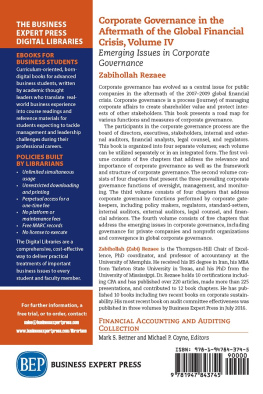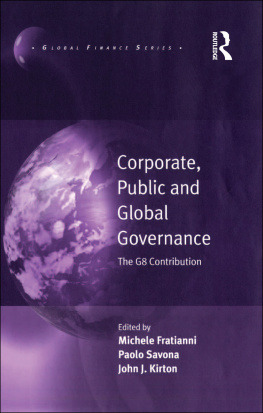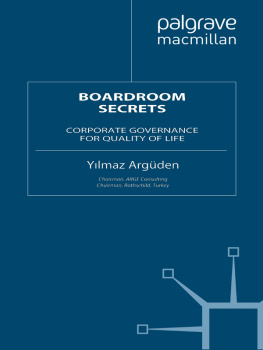Corporate Governance in the Aftermath of the Global Financial Crisis, Volume IV
Copyright 2018. Business Expert Press. All rights reserved. May not be reproduced in any form without permission from the publisher, except fair uses permitted under U.S. or applicable copyright law.
EBSCO Publishing : eBook Collection (EBSCOhost) - printed on 9/11/2019 7:43 PM via UNIVERSITY OF TECHNOLOGY SYDNEY
AN: 1789580 ; Rezaee, Zabihollah.; Corporate Governance in the Aftermath of the Global Financial Crisis, Volume IV : Emerging Issues in Corporate Governance
Account: s4881343
Corporate Governance in the Aftermath of the Global Financial Crisis, Volume IV
Emerging Issues in Corporate Governance
Zabihollah Rezaee

EBSCOhost - printed on 9/11/2019 7:43 PM via UNIVERSITY OF TECHNOLOGY SYDNEY. All use subject to https://www.ebsco.com/terms-of-use
Corporate Governance in the Aftermath of the Global Financial Crisis, Volume IV: Emerging Issues in Corporate Governance
Copyright Business Expert Press, LLC, 2018.
All rights reserved. No part of this publication may be reproduced, stored in a retrieval system, or transmitted in any form or by any meanselectronic, mechanical, photocopy, recording, or any other except for brief quotations, not to exceed 250 words, without the prior permission of the publisher.
First published in 2018 by
Business Expert Press, LLC
222 East 46th Street, New York, NY 10017
www.businessexpertpress.com
ISBN-13: 978-1-94784-374-5 (paperback)
ISBN-13: 978-1-94784-375-2 (e-book)
Business Expert Press Financial Accounting and Auditing Collection
Collection ISSN: 2151-2795 (print)
Collection ISSN: 2151-2817 (electronic)
Cover and interior design by S4Carlisle Publishing Services Private Ltd., Chennai, India
First edition: 2018
10 9 8 7 6 5 4 3 2 1
Printed in the United States of America.
EBSCOhost - printed on 9/11/2019 7:43 PM via UNIVERSITY OF TECHNOLOGY SYDNEY. All use subject to https://www.ebsco.com/terms-of-use
Abstract
Corporate governance has made impressive progress in the past two decades in the aftermath of financial scandals at the turn of the twenty-first century and the 20072009 global financial crisis. Corporate governance has moved to the center stage of corporate culture and business model in defining the roles and responsibilities of all corporate gatekeepers and holding them accountable for contributing to shared value creation for all stakeholders. Today, corporate governance functions in an environment of ever-increasing regulatory reforms established to protect investors and the public from financial scandals and crisis and restore public trust and investor confidence in public financial information and financial markets. Corporate governance, in complying with the ever-increasing regulatory reforms, is striving to improve effectiveness. This volume presents emerging issues in corporate governance in the areas of board oversight function, managerial operation and performance, and gatekeepers responsibilities and accountabilities. Recent regulatory reforms have created a better power-sharing balance between shareholders, the board of directors, and management in contributing to shared value creation for all stakeholders.
This volume consists of five chapters addressing emerging issues in corporate governance including the global perspectives, convergence in corporate governance, and emerging issues relevant to shareholders, directors, and executives. This volume also examines the corporate governance of private and not-for-profit organizations and the future of corporate governance. Anyone who is involved with corporate governance, the financial reporting process, internal and external audit functions, and compliance with laws, rules and regulations should be interested in this volume. Specifically, corporations and their boards of directors and audit committees, executives, internal and external auditors, accountants, governing bodies, policy makers, regulators, users of financial statements (investors, creditors, pensioners), and other professionals (attorneys, financial analysts, bankers) and scholars conducting research in corporate governance will benefit from this volume.
Keywords
business sustainability, corporate governance, emerging issues in corporate governance, global corporate governance, professional ethics, shared value
EBSCOhost - printed on 9/11/2019 7:43 PM via UNIVERSITY OF TECHNOLOGY SYDNEY. All use subject to https://www.ebsco.com/terms-of-use
Contents
EBSCOhost - printed on 9/11/2019 7:43 PM via UNIVERSITY OF TECHNOLOGY SYDNEY. All use subject to https://www.ebsco.com/terms-of-use
In the aftermath of the 20072009 global financial crisis, corporate governance has been in the center stage of businesses, encouraged massive laws, regulations, rules, standards, and best practices that redefined the corporate governance structure, established significant corporate governance reforms, and created new responsibilities and accountability for corporate gatekeepers. Corporate gatekeepers are boards of directors, executives, regulators, auditors, legal counsel, institutional investors, among others. This book presents all applicable laws, regulations, rules, standards, guiding principles, and best practices impacting the structure and effectiveness of corporate governance in protecting the interests of all stakeholders, particularly shareholders. In todays business environment, global businesses are under scrutiny and profound pressures from lawmakers, regulators, the investment community, and their diverse stakeholders to accept accountability and responsibility for their corporate governance effectiveness. Corporate governance is a process (journey) of managing corporate affairs to create shareholder value and protect the interests of other stakeholders. The landscape of corporate governance has significantly changed in recent years, and there is a need for a good book presenting the roles and responsibilities of corporate governance participants including directors, officers, stakeholders, and corporate gatekeepers. Effective corporate governance should develop a proper balance between the achievement of short-term targets and long-term sustainable performance. To effectively fulfill their fiduciary duties, corporate governance participants should lead from the front (and by example) and manage instability in hypercompetitive and global environments.
This timely and relevant book describes the practice of good governance in the aftermath of the recent global crisis, with a keen focus on internal and external corporate governance mechanisms having the potential to address future global challenges. Corporate governance measures are accelerating, converging, and reshaping organizational structure, corporate culture, ethics, trust, and transparency along with the roles, responsibilities, and accountability of all corporate functions designed to add value and contribute to sustainable performance. This book presents a road map for various functions and measures of corporate governance in addressing global finance, capital market, and economic challenges. Written in a practical and succinct style, it will focus on internal corporate governance mechanisms and the incorporated provisions of the Sarbanes-Oxley Act of 2002 (SOX), the Dodd-Frank Act of 2010 (DOF), the Jumpstart Our Business Startups (JOBS) Act of 2012, the Securities and Exchange Commission (SEC)-related implementation rules, and global corporate governance best practices. This book presents the essential and fundamental concepts of corporate governance with a new holistic approach that addresses all corporate activities, performance, reporting, and assurance.













